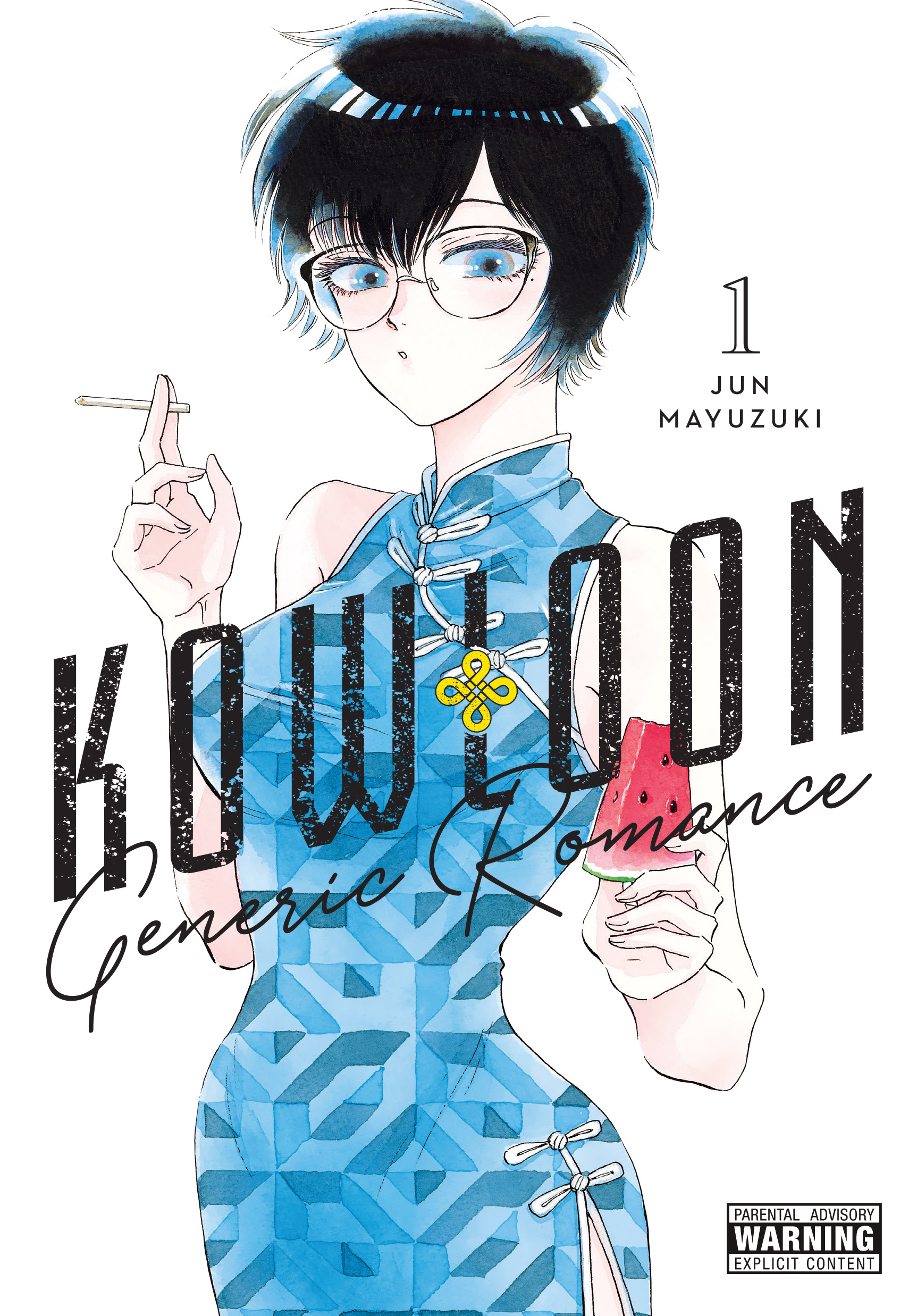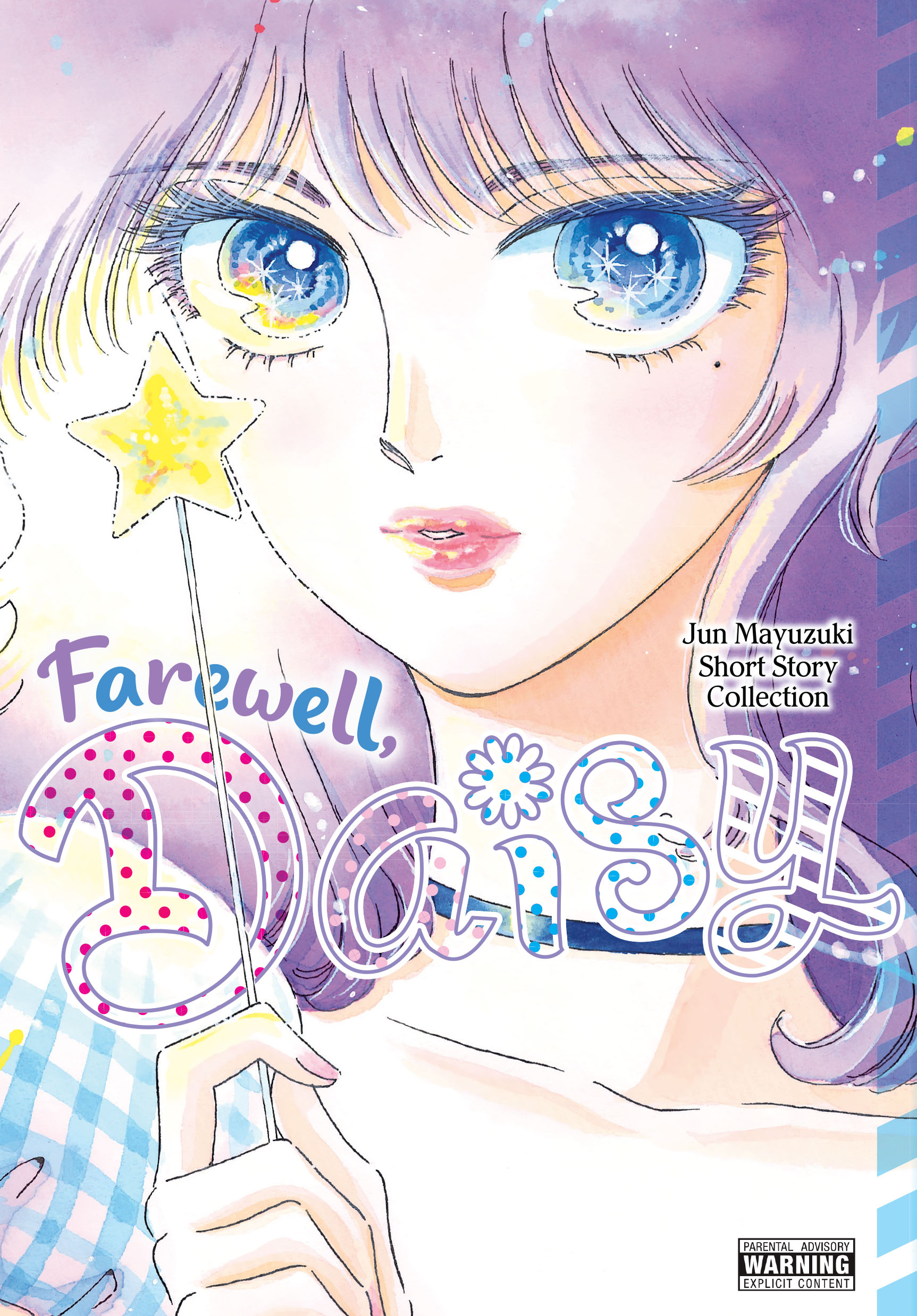Menu
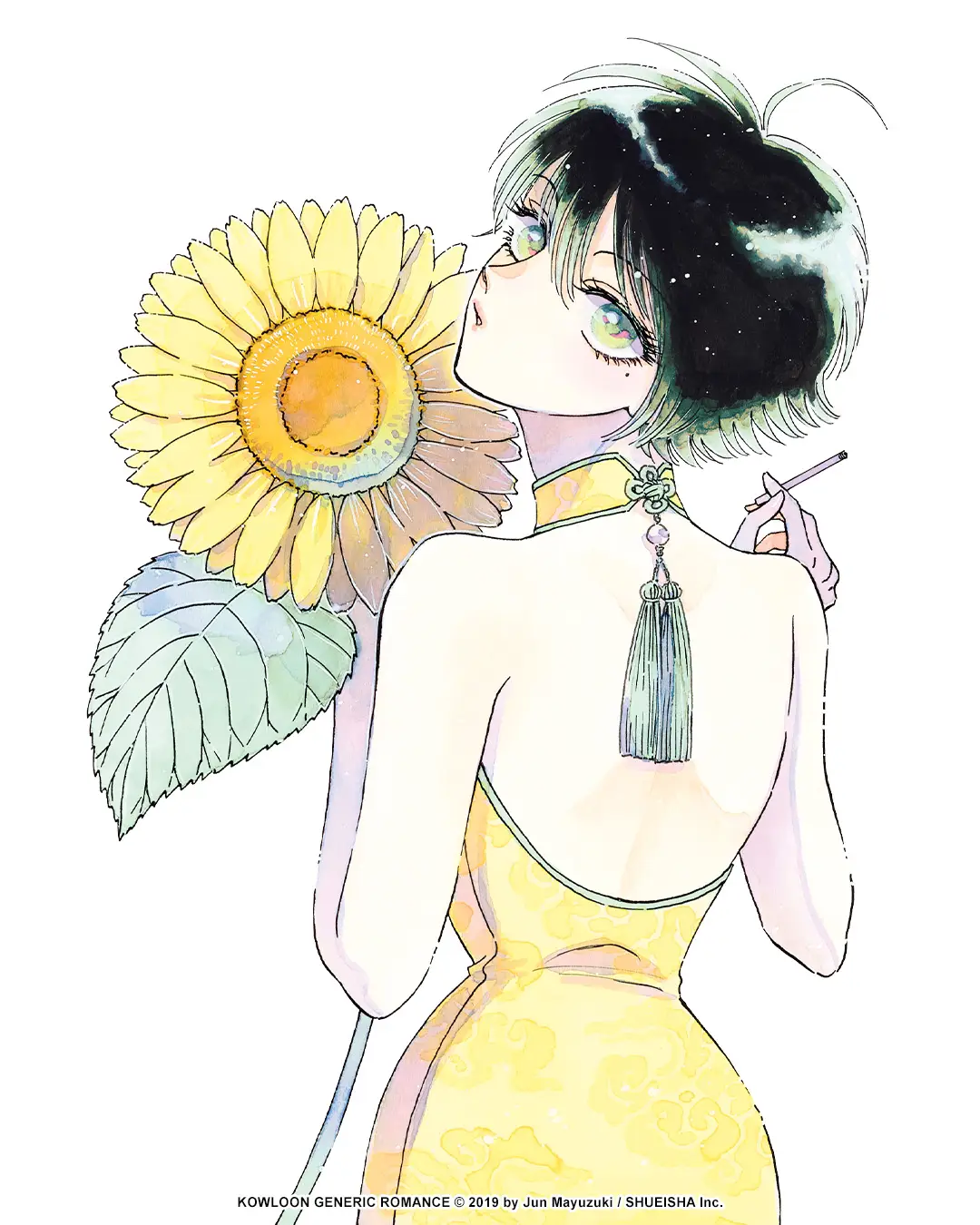
Posted Sep 08, 2025 by Ingrid Lorenzi
Toronto Comic Arts Festival 2023: Interview with Jun Mayuzuki
Back in 2023, Yen Press had the wonderful chance to attend the Toronto Comic Arts Festival. Even better, we also had the chance to interview Kowloon Generic Romance’s creator, Jun Mayuzuki, a most brilliant mangaka and featured guest at this convention.
And now that Kowloon Generic Romance received an anime adaptation and we are releasing the manga Farewell, Daisy, we thought that it was the best time to release the contents of the panels with Jun Mayuzuki from her visit! From character creation to her early days as an artist, dive deeper into Jun Mayuzuki’s craft and rediscover the wonders of Kowloon Generic Romance!
Moderator: Mayuzuki-sensei, can you tell us where you’re from and what it was like growing up there?
Jun Mayuzuki: I’m from Yokohama in Kanagawa Prefecture of Japan. If you’ve read After the Rain, that’s where the main protagonist is from. As for the type of environment I grew up in, both of my parents loved manga, so I grew up surrounded by them.
Moderator: Can you tell us a bit about some of the manga that inspired you as you were growing up?
Jun Mayuzuki: Growing up, I read a lot of shoujo manga magazines, especially Ribon and Nakayoshi, but Ribon in particular was my favorite. The first manga that I ever followed from beginning to end in a weekly or monthly magazine format was Ai Yazawa-sensei’s Tenshi Nanka ja Nai.
Moderator: Can you tell us about the start of your promising career as a manga creator?
Jun Mayuzuki: I made my debut in a shoujo manga magazine. I submitted my work to a manga award, won, and made my debut. I published a few one-shots, maybe three of them, but it wasn’t going great. I felt like I didn’t fit into that magazine style, so I ended up leaving—which is kind of backward from how other manga artists debut. After I left, I ended up bringing my manuscripts to all these different publishers—I didn’t even care about the genre. I went to a seinen magazine, a shoujo magazine, a josei magazine, all sorts of magazine publishing houses, and I would bring my manuscript. I went in circles for a bit, but eventually, I did settle into a seinen magazine. And I think the reason why I didn’t stick with shoujo is because of its many restrictions and conditions. For example, you must have a romantic element, and it has to be this idealized sort of romance that the readers can really look up to and admire. Whereas in a seinen magazine, it's kind of like “anything goes.” There’s a lot of freedom there, and I think that fits my style better.
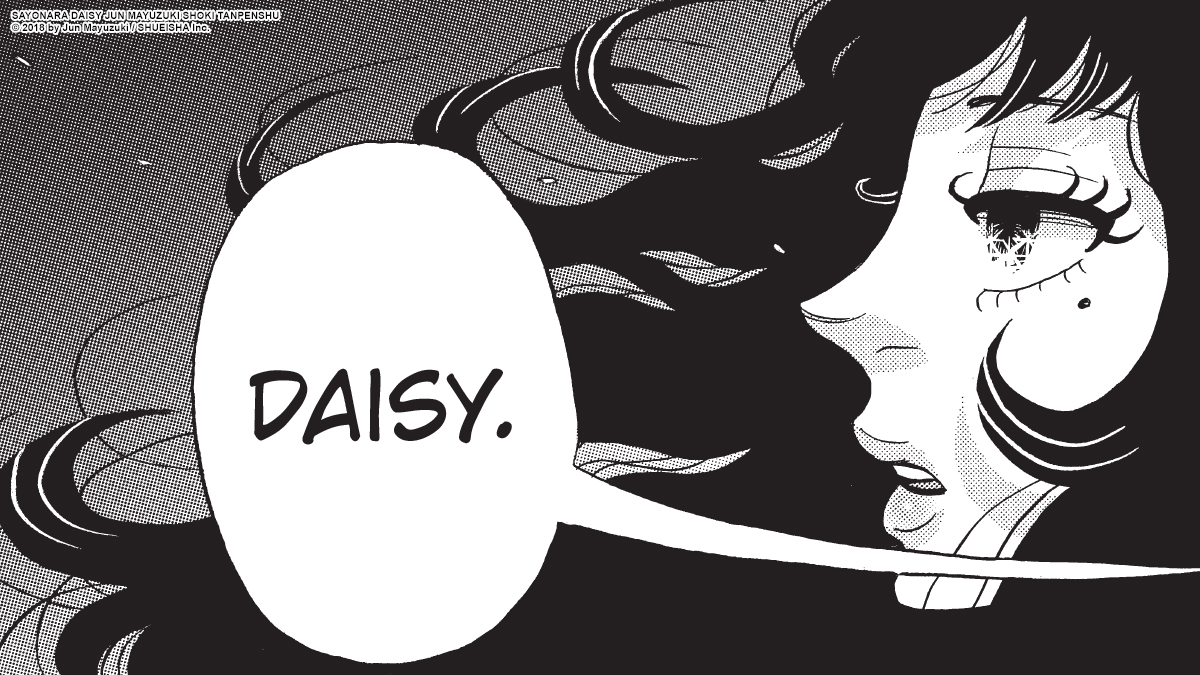
Moderator: For those who haven’t seen the pages of Farewell, Daisy, can you give a brief explanation of the different types of stories and themes that you addressed in the collection?
Jun Mayuzuki: In my collection, there’s lots of different situations, and all these situations are not exactly the same as the situations that I’ve lived through—but the feelings and the emotions that I had when I was going through those periods of my life are reflected in my story.
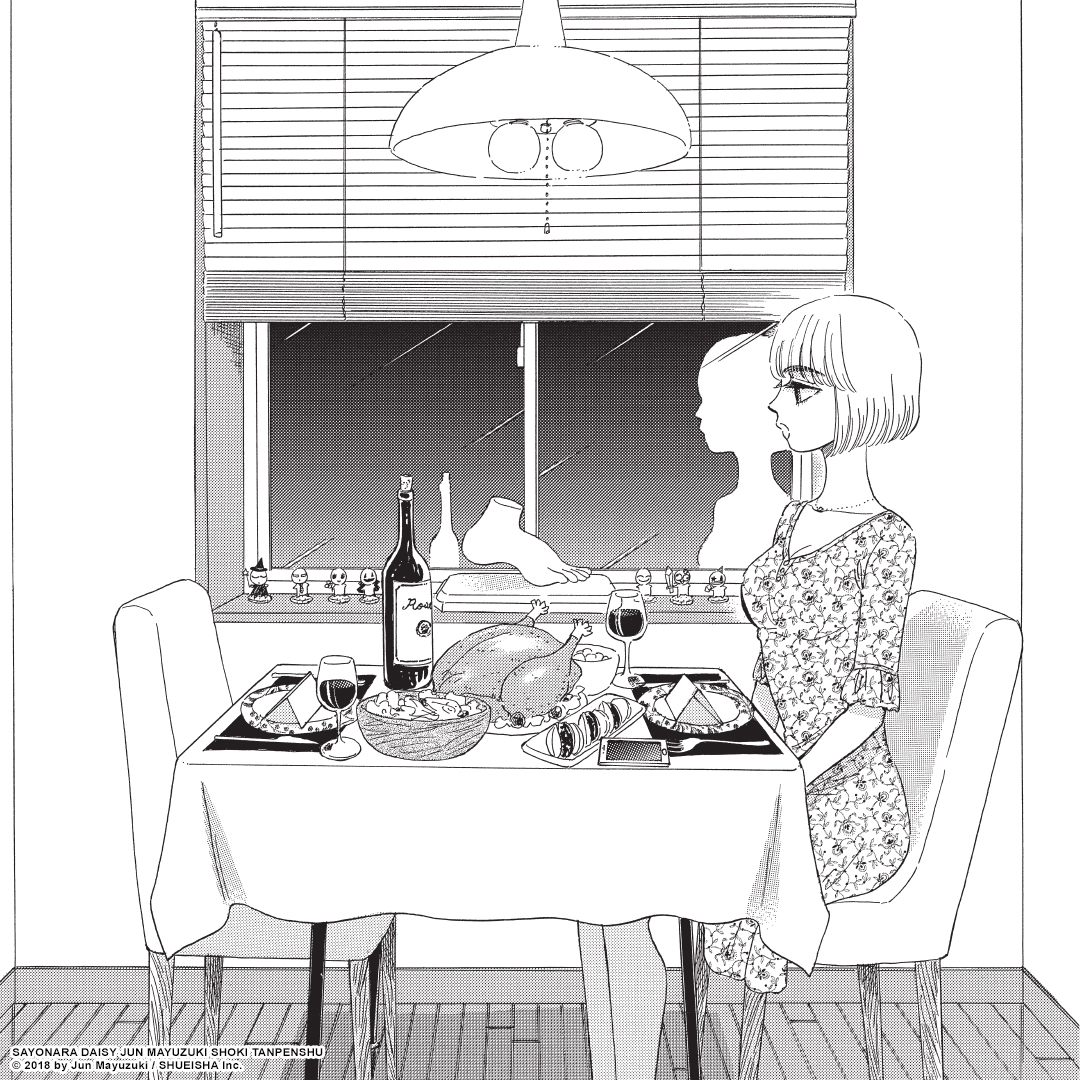
Moderator: So of course, following the many years of working on Farewell, Daisy, you came to work on—which at the time was your longest serialized work—After the Rain. For those of you who followed Mayuzuki-sensei for a few years at this point, there’s a chance that you became a fan of her through After the Rain, which is a series that revolves around a girl who’s working at a family restaurant and has a crush on a man who is much older than her. A beautiful manga—which of course was adapted into both an anime series and a live-action movie. Mayuzuki-sensei, can you please tell us about the creation of After the Rain? Can you tell the story of starting to work on this amazing series?
Jun Mayuzuki: I have a lot of fond memories of creating my collection of one-shots and short stories, but I think it was only with After the Rain that I discovered my own ideal pace. I didn’t struggle with my storyboards anymore like I used to, and I think that’s because I finally figured out how I want to express myself in my manga. I’ve learned what it is that works for me.
Moderator: Many of us learned about you through After the Rain, but of course right now you’re working on Kowloon Generic Romance. Will you please tell us the story of how you came up with the idea of Kowloon Generic Romance and how it came to be the series that you’re working on now?
Jun Mayuzuki: After the Rain represents my past self, and it has a lot of things I was thinking about and feeling—and that’s sort of the main component of it. By the time I was done with After the Rain, I really felt like I had written everything I wanted to write about. But then I thought, “What next?” and realized that I really wanted to draw about what I’m currently thinking and feeling. There’s this big theme of past, present, and future in Kowloon Generic Romance, as well as a theme of nostalgia. And I think the reason the nostalgia shows up so much is that it’s a theme that I would like to draw about forever and ever. I really like this theme.
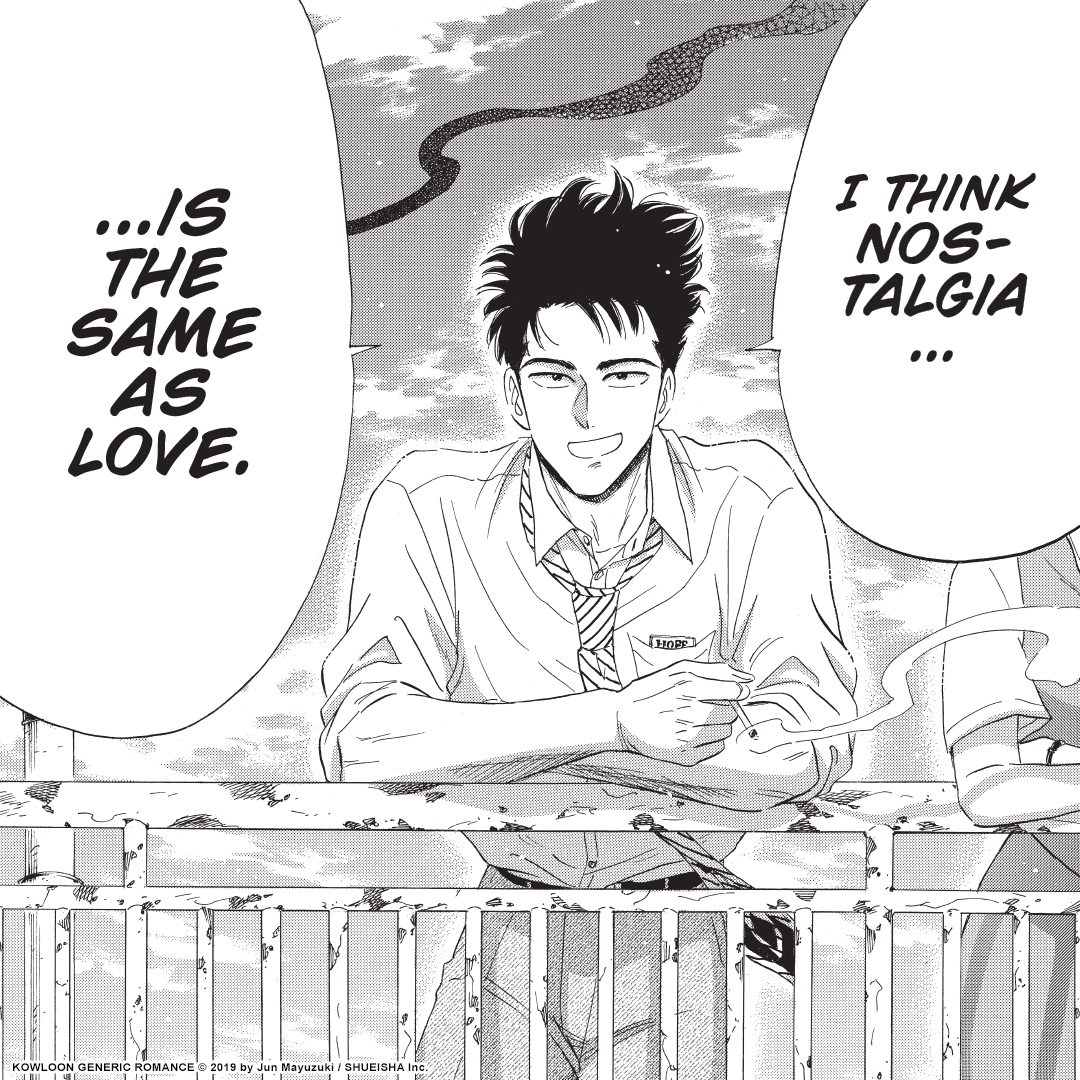
Moderator: What inspired the world of Kowloon Generic Romance?
Jun Mayuzuki: About Kowloon Walled City—I have been interested in it ever since I watched this TV documentary when I was in elementary school. Its atmosphere was just so appealing to me. So I’ve always had this desire of creating a manga that was set in Kowloon, but I couldn’t think of a story that would fit that setting and couldn’t think of anything that would feel nice to be placed there. After finishing After the Rain, there was this question in the back of my head of “What am I going to do now?” But then I came up with a story and thought, “Oh, this story really fits that Kowloon atmosphere.” And that’s why I picked Kowloon as the setting for my next work. I don’t really remember why I decided to set it in the future, but Kowloon Walled City is like a symbol of nostalgia. It’s something everyone can feel nostalgic about. And nostalgia is a theme that I really like to pick up and work with. I’ve never been to Kowloon Walled City, but when I look at it, I get this feeling of nostalgia, and I feel like that fits perfectly with the story I’m trying to tell.
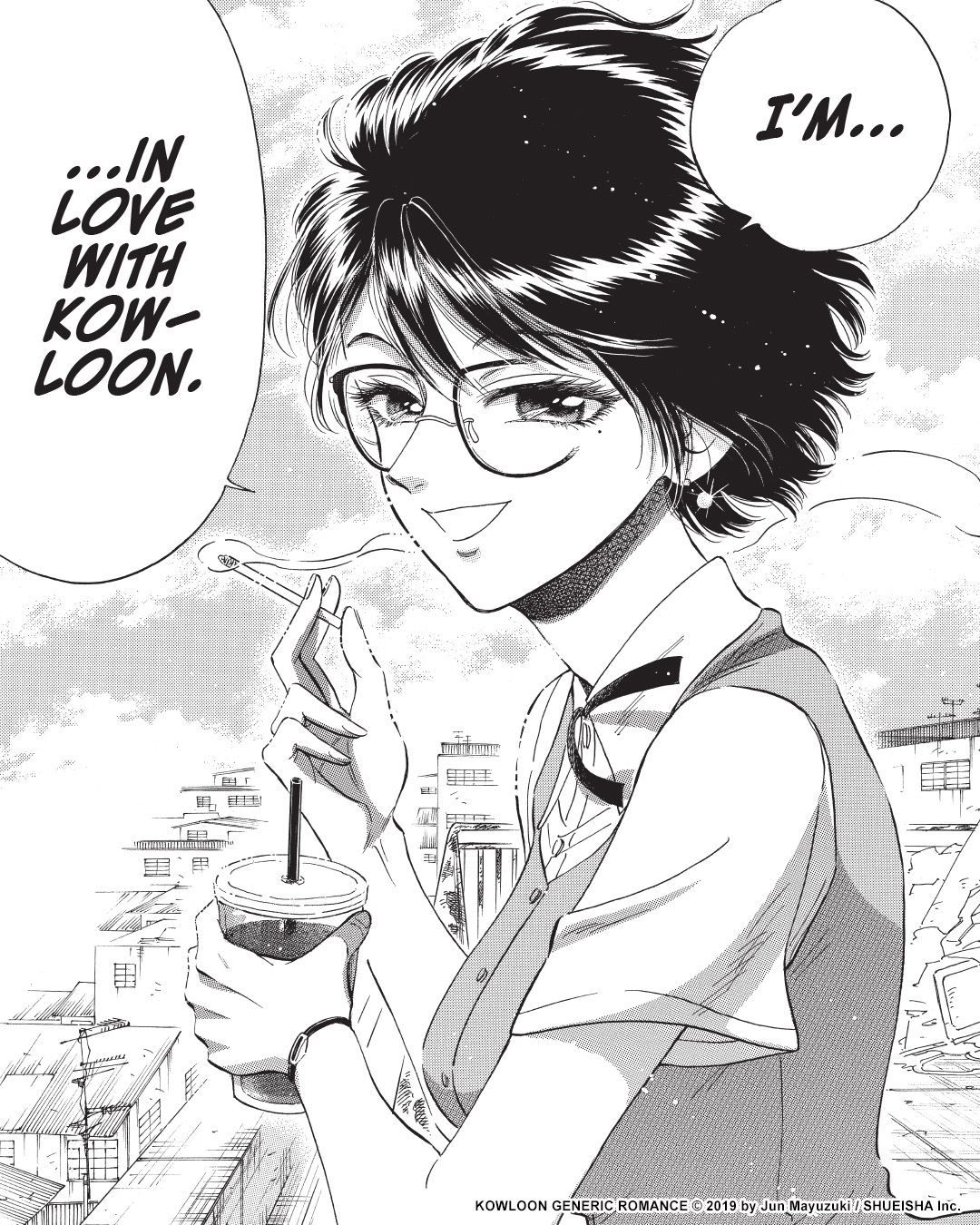
Moderator: Can you tell us what went into the creation of Kujirai’s personality? We’d love to hear it.
Jun Mayuzuki: Personality-wise, according to my editor, she is me. When we first started creating Kowloon Generic Romance, he would sometimes call me Kujirai instead of Mayuzuki, like, “Hey, Kujirai!” and I would be like, “What?” So that’s where her personality sort of comes from. I also find that it’s really important to have some habits or quirks. I remember having a conversation with my editor, and I mentioned that my mother had this habit of eating watermelon and then smoking a cigarette and saying, “Oh, that’s so good together. It’s so delicious.” When I told that story to my editor, he was like, “Oh, that’s a great story. You should use it.”
Moderator: Let’s move on to the next character, Kudou, who’s a very frustrating but also slightly charming character. Can you tell us about the creation of Hajime Kudou?
Jun Mayuzuki: Kudou was actually modeled after a person I know very well. He’s someone who used to work in Shueisha’s editorial department, and the one who allowed me and Okuma-san (her current editor) to meet. In real life, he’s not as frustrating. There have been times when I said, “Oh, please, can you do this for me?” and he’d complain and grumble, but then he’d go ahead and do it. Kudou is modeled after him in the sense that he has this Showa-era-like appeal—I guess he’s old-fashioned. But the positive nature of Kudou, his sort of roundabout way of being kind and being super reliable—that all traces back to this person as a model. And I actually did go back to tell him that I modeled Kudou after him. He looked super proud of himself and then he told me, “But you know what? I think After the Rain was a better title,” and that he will read Kowloon Generic Romance only after it is finished.
Moderator: We have one more character we want to learn about. Can you tell us about the creation of Hebinuma?
Jun Mayuzuki: Miyuki Hebinuma is someone who I came up with before After the Rain. I was trying to come up with a storyboard for a serialization, and he was a central character in that storyboard. But the serialization just wasn’t working out, so we had to scrap it. Still, Hebinuma was someone who was always in the back of my head, and I kept thinking, “I really want to use this character one day.” When the time came to reincorporate him into Kowloon, I wanted a character with a similar atmosphere to Heath Ledger's Joker in the film The Dark Knight. I was also thinking about the Japanese all-female troupe Takarazuka, and the top stars in that theater troupe. I wanted him to have the same kind of aura as them as well.
Moderator: Can you take us through what you think of your considerations as you decide what imagery is laid out in the pages of Kowloon Generic Romance?
Jun Mayuzuki: So I’m not a musician, I can’t compose music, but I do try to draw manga with the same kind of intention as a composer. Something that’s really important to me is the tempo of the story. I have this internal tempo that’s very personal to me, and I’m very conscious of it when I’m creating. I’m not sure where I learned to do this; maybe it’s just something that I knew how to do innately, or it could be something that I was influenced by from some of the works I enjoyed in my past, like Neon Genesis Evangelion. I find that it has this unique rhythm to the storytelling, and that’s very inspiring to me. Inside of me, there’s this ideal rhythm I’m trying to create in my works, and I’m always trying to get as close to that as possible.
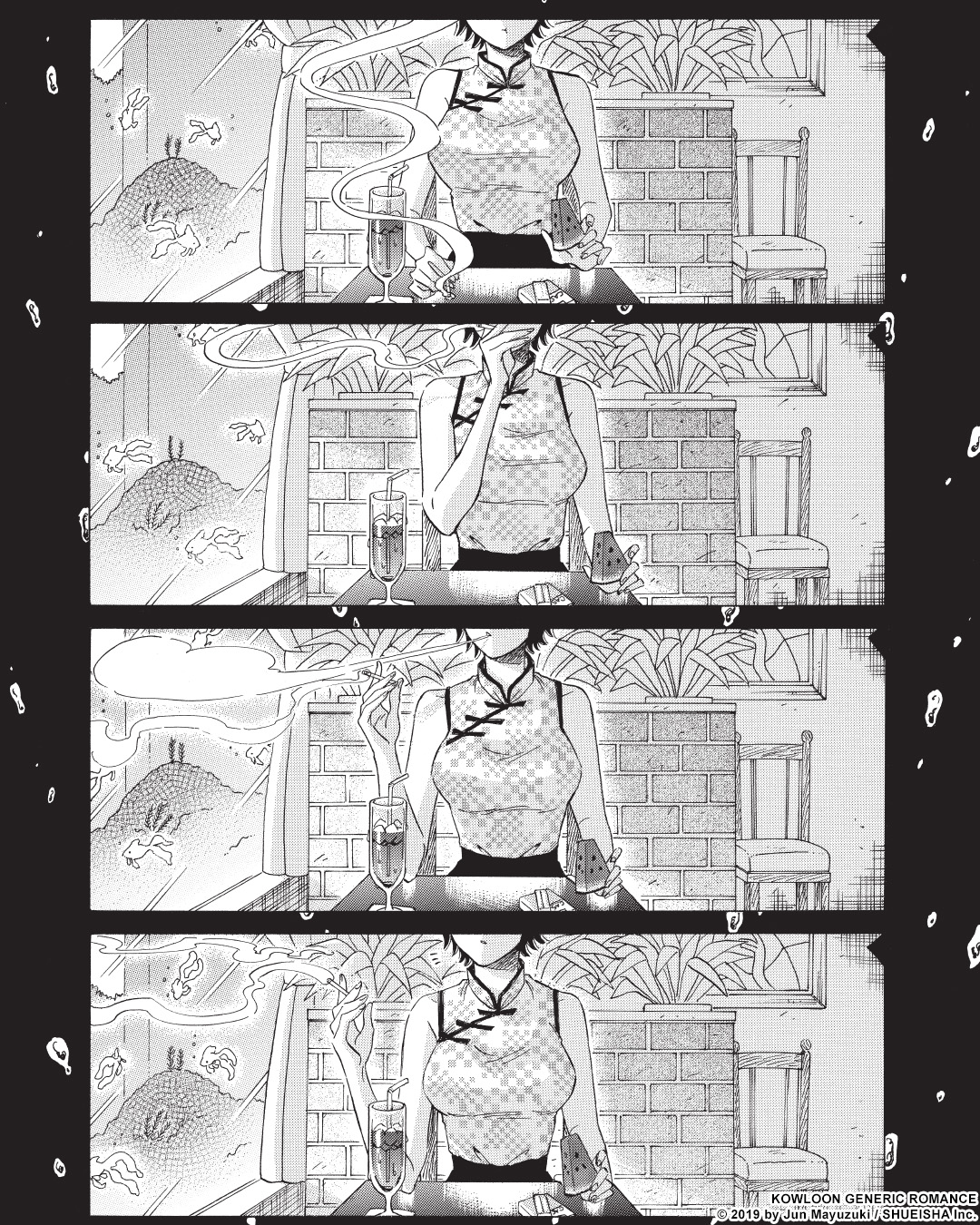
Moderator: What advice do you have for the creators who have joined us in this room today?
Jun Mayuzuki: Don’t compromise on what you love. I know that, as young creators, there will be times when you feel like you have to compromise, that you have to draw something that you’re not really interested in, that you don’t really love. Because you feel like that’s the only way to get anywhere in this world. And based on my experience, my advice to you is just don’t do it. Draw what you love. Don’t compromise on that. Hold on to that thought. And have the courage to let go of ideas you have grown attached to but haven't realized yet—it's okay, you will definitely be able to use them later. Have the courage to hold on to the things you love, and the courage to let go of them for a while. And I know this sounds so cliché, but courage is the one word I want to leave you with.
Kowloon Generic Romance, Vols. 1-9 are available now! And don't forget to pre-order your copy of Farewell, Daisy: Jun Mayuzuki Short Story Collection, available this August!








